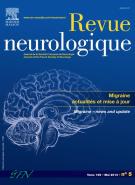 Idiopathic myopathies are a group of acquired muscular diseases considered as autoimmune disorders. Characteristic histopathologic features allow the classification into myositis (polymyositis, dermatomyositis, and inclusion body myositis) and immune-mediated necrotising myopathies. But overlapping histological features may be observed between different idiopathic myopathies and even between acquired and genetic muscular diseases. In the group of idiopathic myopathies important discrepancies can be observed concerning extra-muscular involvement and prognosis. The discovery of myositis-specific antibodies and myositis-associated antibodies has led to a serologic approach complementary to histological classification, because striking associations of myositis-specific antibodies with clinical features and survival were observed. This publication, written in French, reviews the myositis-specific antibodies including autoantibodies directed against the aminoacyl tRNA-synthetase enzymes, the Mi-2 protein and the signal recognition particle, and the main myositis-associated autoantibodies, that can be tested in clinical practice. It also focusses on newly described dermatomyositis-associated antibodies (directed against: transcription intermediary factor 1 family proteins, small ubiquitin-like modifier activating enzyme, and melanoma differentiation-associated gene 5), and immune-mediated necrotizing myopathy-associated antibodies (directed against HMGcoAreductase). The authors conclude that myositis-specific antibodies and myositis-associated antibodies are useful for the diagnosis of forms of autoimmune myopathies with distinct clinical features. They may help to define patients into clinical syndromes with specific outcomes and thus influence treatment strategies.
Idiopathic myopathies are a group of acquired muscular diseases considered as autoimmune disorders. Characteristic histopathologic features allow the classification into myositis (polymyositis, dermatomyositis, and inclusion body myositis) and immune-mediated necrotising myopathies. But overlapping histological features may be observed between different idiopathic myopathies and even between acquired and genetic muscular diseases. In the group of idiopathic myopathies important discrepancies can be observed concerning extra-muscular involvement and prognosis. The discovery of myositis-specific antibodies and myositis-associated antibodies has led to a serologic approach complementary to histological classification, because striking associations of myositis-specific antibodies with clinical features and survival were observed. This publication, written in French, reviews the myositis-specific antibodies including autoantibodies directed against the aminoacyl tRNA-synthetase enzymes, the Mi-2 protein and the signal recognition particle, and the main myositis-associated autoantibodies, that can be tested in clinical practice. It also focusses on newly described dermatomyositis-associated antibodies (directed against: transcription intermediary factor 1 family proteins, small ubiquitin-like modifier activating enzyme, and melanoma differentiation-associated gene 5), and immune-mediated necrotizing myopathy-associated antibodies (directed against HMGcoAreductase). The authors conclude that myositis-specific antibodies and myositis-associated antibodies are useful for the diagnosis of forms of autoimmune myopathies with distinct clinical features. They may help to define patients into clinical syndromes with specific outcomes and thus influence treatment strategies.
